

'Allostatic Load' is the Reason You're Anxious and Stressed from Being Alone. Allostatic load. The graph represents the effect of increased stress on the performance of the body.

Do stress factors alter DNA methylation during aging? Stress may change DNA methylation patterns Flickr What is meant by epigenetic aging?
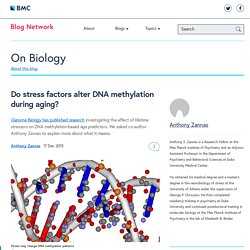
Epigenetic aging is a measure that uses DNA methylation levels to predict an individual’s age. It takes into account the methylation levels of many sites from different parts of the genome. What these sites have in common is that they correlate strongly with chronological age. Several DNA methylation-based predictors of age have been developed.
Stress Symptoms in Men. The Best Science-Backed Mindfulness Practices for Stress. Brain, The Immune System And Stress: Ultimately Connected, New Studies Suggest. Colorful abstract background blur motion with bokeh lightGetty Something we all are faced with is stress, especially during the end of the year when we have deadlines to meet, along with the numerous responsibilities during the holiday season.
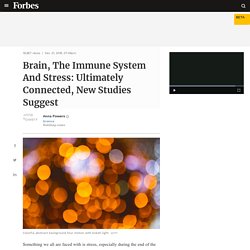
A report put out by the American Institute of Stress, found that about 80% of workers feel stress on the job, with 40% feeling that their “job is very or extremely stressful.” This is due to the fact that the workforce landscape has changed and, as a result, many workplaces are attempting to mitigate stress. However, as I’ve written before, stress causes a biological response in the body which is associated with headaches, depression and other illnesses. Thus, it not only affects us mentally but also physically. For a long time it has been thought that the brain and the immune system are two separate entities that exist in different realms.
Scientists have found that immune system supports the brain during times of psychological distress. Scientists Identify The Physical Source of Anxiety in The Brain. The Fight or Flight Response - NeilMD.com. What is the "fight or flight response?
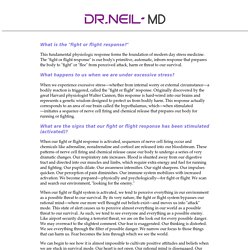
" This fundamental physiologic response forms the foundation of modern day stress medicine. The "fight or flight response" is our body's primitive, automatic, inborn response that prepares the body to "fight" or "flee" from perceived attack, harm or threat to our survival. What happens to us when we are under excessive stress? When we experience excessive stress—whether from internal worry or external circumstance—a bodily reaction is triggered, called the "fight or flight" response. Originally discovered by the great Harvard physiologist Walter Cannon, this response is hard-wired into our brains and represents a genetic wisdom designed to protect us from bodily harm. The Fight or Flight Response - NeilMD.com. The Science of Stress. We all experience stress.
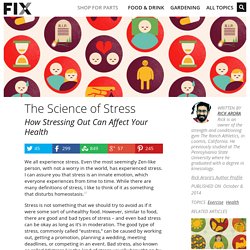
Even the most seemingly Zen-like person, with not a worry in the world, has experienced stress. Stress (biology) Walter Cannon used it in 1926 to refer to external factors that disrupted what he called homeostasis.[2] But "...stress as an explanation of lived experience is absent from both lay and expert life narratives before the 1930s".[3] Physiological stress represents a wide range of physical responses that occur as a direct effect of a stressor causing an upset in the homeostasis of the body.

Upon immediate disruption of either psychological or physical equilibrium the body responds by stimulating the nervous, endocrine, and immune systems. The reaction of these systems causes a number of physical changes that have both short and long term effects on the body. Homeostasis is a concept central to the idea of stress. In biology, most biochemical processes strive to maintain equilibrium (homeostasis), a steady state that exists more as an ideal and less as an achievable condition. The ambiguity in defining this phenomenon was first recognized by Hans Selye (1907-1982) in 1926. Stress Management Group Activities. Stress, in and of itself, is not good or bad.

It can be motivating. It can also be physically and psychologically harmful. The effect of stress is determined by your reaction to it so learning to manage it is a necessity. These group stress busting activities can help. Activity #1: Have a Treasure Hunt Treasure hunts are a fun way to have groups work in smaller teams, teach problem-solving skills, and introduce a little friendly competition. Purpose Treasure hunts can strengthen relationships, foster teamwork, and help new members fit in. Design There are many possibilities when it comes to designing a treasure hunt. Having to figure out riddles to find the next clue Having to find a list of objects (or specific information) within a certain area. 7 Facts About Sugar and Depression: Is There a Connection? Image by Brook Lark Food can have many effects on your mood and emotions.
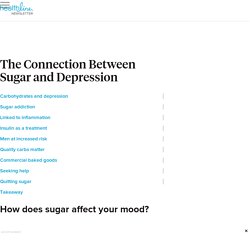
When you’re hungry and want food, you can be grumpy, upset, or even angry. When you’ve had a delicious meal, you may feel elated and euphoric. The food you eat can also have long-term implications for your health. Specifically, eating too much sugar may increase your risk for mood disorders, including depression. Sugar occurs naturally in complex carbohydrates like fruits, vegetables, and grains. Eating too many simple sugars may increase your risk for depression, mood disorders, and several chronic health issues. Researchers in London discovered that a diet rich in whole foods like fruits, vegetables, and fish, can lower your risk for depression in middle age. You already know you should eat plenty of fruits, vegetables, and fish for heart and brain health and to help ward off chronic diseases. A study done in rats found that the brain’s sweet receptors are not adapted to constant and high levels of sugar. 1. 3.
Is Depression Hereditary? Study Pinpoints 80 Genes Linked to the Illness. How a 4th-century Taoist concept is treating anxiety. While the Tao Te Ching is not one of the world’s most discussed religious texts, at least relative to the amount of attention the Bible, Quran, and Buddhist and Hindu doctrines receive, Laozi’s slim volume of instructions has massively influenced how we think about Eastern philosophy.
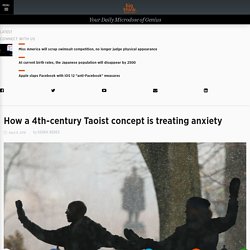
Stress and weight gain.